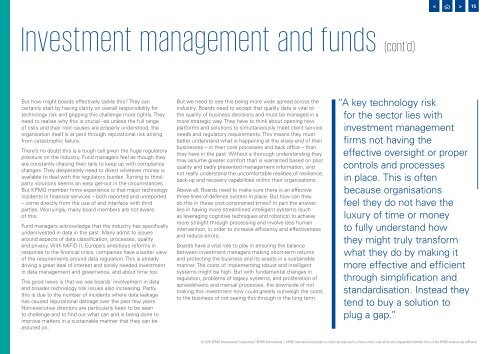Technology risk radar
2mQgADD
2mQgADD
Create successful ePaper yourself
Turn your PDF publications into a flip-book with our unique Google optimized e-Paper software.
15<br />
Investment management and funds (cont’d)<br />
But how might boards effectively tackle this? They can<br />
certainly start by having clarity on overall responsibility for<br />
technology <strong>risk</strong> and gripping this challenge more tightly. They<br />
need to realise why this is crucial –as unless the full range<br />
of <strong>risk</strong>s and their root causes are properly understood, the<br />
organisation itself is at peril through reputational <strong>risk</strong> arising<br />
from catastrophic failure.<br />
There’s no doubt this is a tough call given the huge regulatory<br />
pressure on the industry. Fund managers feel as though they<br />
are constantly chasing their tails to keep up with compliance<br />
changes. They desperately need to divert whatever money is<br />
available to deal with the regulatory burden. Turning to thirdparty<br />
solutions seems an easy get-out in the circumstances.<br />
But KPMG member firms experience is that major technology<br />
incidents in financial services – both reported and unreported<br />
– come directly from the use of and interface with third<br />
parties. Worryingly, many board members are not aware<br />
of this.<br />
Fund managers acknowledge that the industry has specifically<br />
underinvested in data in the past. Many admit to issues<br />
around aspects of data classification, processes, quality<br />
and privacy. With MiFID II, Europe’s ambitious reforms in<br />
response to the financial crisis, companies have a better view<br />
of the requirements around data regulation. This is already<br />
driving a great deal of interest and sorely needed investment<br />
in data management and governance, and about time too.<br />
The good news is that we see boards’ involvement in data<br />
and broader technology <strong>risk</strong> issues also increasing. Partly<br />
this is due to the number of incidents where data leakage<br />
has caused reputational damage over the past few years.<br />
Non-executive directors are particularly keen to be seen<br />
to challenge and to find out what can and is being done to<br />
improve matters in a sustainable manner that they can be<br />
assured on.<br />
But we need to see this being more wide spread across the<br />
industry. Boards need to accept that quality data is vital to<br />
the quality of business decisions and must be managed in a<br />
more strategic way. They have to think about opening new<br />
platforms and solutions to simultaneously meet client service<br />
needs and regulatory requirements. This means they must<br />
better understand what is happening at the sharp end of their<br />
businesses – in their core processes and back office – than<br />
they have in the past. Without a thorough understanding they<br />
may assume greater comfort than is warranted based on poor<br />
quality and badly presented management information, and<br />
not really understand the uncomfortable realities of resilience,<br />
back-up and recovery capabilities within their organisations.<br />
Above all, Boards need to make sure there is an effective<br />
three-lines-of-defence system in place. But how can they<br />
do this in these cost-constrained times? In part the answer<br />
lies in having more streamlined intelligent systems (such<br />
as leveraging cognitive techniques and robotics) to achieve<br />
more straight through processing and involve less human<br />
intervention, in order to increase efficiency and effectiveness<br />
and reduce errors.<br />
Boards have a vital role to play in ensuring the balance<br />
between investment managers making short-term returns<br />
and protecting the business and its assets in a sustainable<br />
manner. The costs of implementing robust and intelligent<br />
systems might be high. But with fundamental changes in<br />
regulation, problems of legacy systems, and proliferation of<br />
spreadsheets and manual processes, the downside of not<br />
making this investment now could greatly outweigh the costs<br />
to the business of not seeing this through in the long term.<br />
“A key technology <strong>risk</strong><br />
for the sector lies with<br />
investment management<br />
firms not having the<br />
effective oversight or proper<br />
controls and processes<br />
in place. This is often<br />
because organisations<br />
feel they do not have the<br />
luxury of time or money<br />
to fully understand how<br />
they might truly transform<br />
what they do by making it<br />
more effective and efficient<br />
through simplification and<br />
standardisation. Instead they<br />
tend to buy a solution to<br />
plug a gap.”<br />
© 2016 KPMG International Cooperative (“KPMG International”). KPMG International provides no client services and is a Swiss entity with which the independent member firms of the KPMG network are affiliated.


